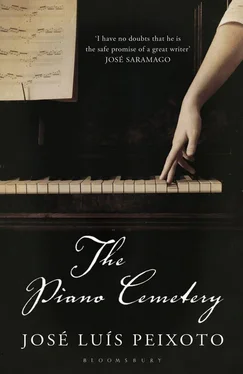The sun is dazzling, reflected by the loose plastic bags dragging along the ground. Around the market there are stalls and noise. Inside, in there, are the vegetables and fruit. Out here there are clothes, plastic toys, stakes stuck into the ground and cars passing by slowly, steering round the people who choose and look and ask for prices. Íris starts crying because she wants a toy — a clothes-iron made of plastic, a set of little saucepans made of plastic, a hairbrush and mirror and hairpins made of plastic. My wife tells her that if she behaves, if she behaves, when they’ve finished looking at everything she will come back and buy her a toy.
My wife, dressed in black, and little Íris, continue on, hand in hand, making their way between people, looking at everything. And then, after a mixture of people and sun and colours yellowed by the sun, they reach a stall that displays sweaters, trousers, shirts and blouses and shorts and socks. My wife looks over the clothes and immediately sees only the black ones. Black smocks for the summer, plain black blouses for the summer. Íris, gripping her grandmother’s arm, sees only the two little gypsy children sitting on the clothes table, playing, naked from the waist down, barefoot, mouths circled with dust. My wife and Íris are surrounded by the remains of phrases spoken by the people passing by, by bits of a voice shouting into a megaphone that reaches them on the breeze, the dogs fighting, down over there, by the motorcars that slowly pass, steering round them, and occasionally sound their horns. It is now. My wife lifts her eyes from the clothes and sees the gypsy who came last week to bring Íris’s little blouse. She sees the cold — icy — eyes of the gypsy who on Sunday, as they returned from the workshop, was out on the street, leaning up against a corner.
He’s maybe sixty. Gypsies never know their own age. It’s as though they were born at the beginning of time. He’s smoking a cigarette. When a breeze comes past, it ruffles the smoke and his beard. He looks at my wife. She’s at his stall. He’s leaning on his wagon. He straightens up. This movement, and what he says with his eyes, calls my wife over. Íris goes with her. And it’s all natural, with no hesitations — the gypsy lifts Íris up from under her arms and hands her to the youngest gypsy, who’s leaning on the clothes table, standing waiting for customers; this gypsy puts Íris down next to the two children who are playing on the clothes table, who are throwing socks at one another; my wife gives her hand to the gypsy so he can help her through the back door into the wagon — the door closes.
Inside the wagon’s little storage room my wife is sitting on a heap of sweaters, still wrapped in thin shiny plastic bags. The gypsy is kneeling in front of her. This moment clashes with the moment in which they throw themselves at one another and kiss — the hard lips, rubbing, struggling, squeezing together. The gypsy’s hands are dry — dry veins in his skin — and they have gold rings on their fingers. The gypsy’s hands squeeze my wife’s chest, the black blouse, the thick black bra. One of his hands goes up under her skirt. Perhaps I no longer know her body. Years have passed since the last time I touched her skin — my hands feeling the small of her back, the shape of her waist. The gypsy draws back. His gaze and my wife’s gaze don’t draw back. He undoes his trousers. The quick, heavy breathing, only gradually calming down. And once again the gypsy throws himself on my wife. There is a moment of silence as he enters her. And there they remain, indifferent to the world, in the wagon’s little storage room, on a heap of nighties in plastic bags that make a noise with every movement, fitted together — my wife’s arms and legs wrapping around him.
My wife emerges quickly from the wagon, arranging her hair. The gypsy emerges slowly, as though returning the movement to each leg and each arm. Abruptly my wife lifts Íris off the clothes table. In the air, Íris waits for her astonished face to be able to say goodbye to the children who played with her and who are still on the tangle of nighties, watching her move away. My wife takes her in her arms and makes her way between the people who cross her path.
She stops, breathes, puts Íris down on the ground. She straightens herself up, breathes, keeps walking. At a given moment the stretched-out strings turn concrete, the knots at the end of the stakes turn concrete. My wife’s face is serene. She doesn’t think about stopping, but she feels Íris’s tugs and, looking at her, she remembers. Together they reach the toy stall.
Íris, holding her grandmother’s hand, falls back as she looks at the plastic case she’s holding in her other hand — hairpins, a mirror and a hairbrush for dolls. Which is why she pays no attention to the way they are going, and is only surprised when they reach the workshop, when my wife is already putting the key into the lock of the big workshop door.
The nieces of the woman from the boarding house come back from the cemetery alongside my wife. They had nothing to say, but they asked questions just so they could be saying something. My wife wasn’t afraid of silence, she needed it, and she didn’t answer them. Sometimes she’d change the expression on her face, as though these slight changes had some meaning, but she didn’t answer them. When they were saying their goodbyes, friendly, they told her that late that afternoon they would be going to the boarding house to deal with some matters relating to the sharing-out and they’d expect her there.
My wife kept on going, without any sleep. She spent the afternoon dealing with our children, with Marta’s help. When she managed to sit down, she stopped to enjoy the rays of light that passed through the windows and came to rest diagonally on the floor.
After the streets, she reached the pavement outside the boarding house, the wall with the ivy leaves that she’d climbed so many times to meet me. We were young on the nights of that summer. That evening my wife was still young, but she knew she had lost something for ever. In her thoughts, her godmother’s face, dead, lying in the chapel, mingled with all the years when that same face, alive, another face, would smile at her, would become angry with her, would explain everything to her. And she’d say:
‘Daughter.’
She’d end her requests with that word. Often, in the middle of a sigh, within some phrase, she would say just that word:
‘Daughter.’
My wife remembered a great deal — everything. Too many winters, Christmases, too much time when it was just the two of them, together and alone. One of the nieces of the woman from the boarding house opened the door and wrapped her in a voice that feigned familiarity. The walls were strong — they were eternal, one might say. My wife went into the house, that house she never thought she would enter again. In every corner she saw herself, little, enchanted by some mystery, or sad. In every corner, in the empty space of the open doors, in the corridor, she saw the face of her godmother — smiling, angry, explaining everything to her, just straightforward.
In the living room the other niece took some steps towards my wife to speak to her as though they had lost the same thing.
‘Leave it,’ she said.
The nieces’ husbands, rather bored, remained seated in their armchairs.
On the table there were tea services wrapped in newspaper, open boxes of cutlery, rows of goblets, piles of folded doilies, copper ashtrays, orphaned figures in porcelain.
Then, after a moment that the nieces deemed sufficient, they sat my wife down in an armchair and said to her:
‘We’ve called you here because we want you to accept something.’
And they looked at her, expecting gratitude. And the fake enthusiasm of their own expressions prevented them from noticing that my wife’s face remained immobile. Trying to preserve the surprise, they moved almost in silence, clumsily. With their bodies they were blocking the thing they wanted to give her. They looked back at her over their shoulders. One of them walked backwards towards her. When she turned, she held out to her the thing they wanted to give her. And looked at her, expectant.
Читать дальше












